“That’s a Bingo!”.
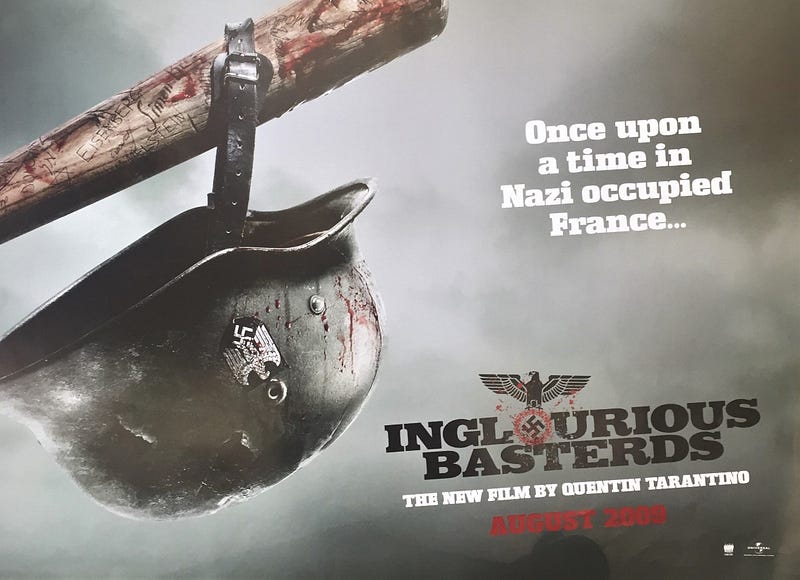
It was a bright and sunny August day in the summer of 2009 apparently, but I was forgoing the warmth of a benevolent sun for the calming dark confines of my local cinema, and the sixth film in the chronological lore of director Quentin Tarantino. There is little doubt, even in retrospect, that I couldn’t have been more excited if I tried. So excited in fact that after seeing his grisly re-telling, re-shaping and re-imagining of a collective history he’d do likewise a decade or so later with his magnum opus Once Upon a Time in Hollywood, I immediately returned to the cosy darkness of my local cinema to watch his twisted turn on history once again. Returning home, a babysitter was hastily arranged for as soon as memory now fails me, but I’d guess at a day or so later, and I “persuaded” the love of my life to accompany me to the cinema to watch a film I simply couldn’t stop talking about and now, 14 years later, my beautiful son now quotes dialogue from a Quentin Tarantino movie that his Dad dragged his Mum to see and “That’s a Bingo!” and I have a burgeoning fan of the great cinematic storyteller for a son.
My unabashed cinema love for QT is linked directly below or the glorious performances in “Nazi occupied France” follows immediately beneath.
The Genius of Quentin Tarantino
The nine films of Quentin Tarantino. Or is it a Hateful Eight?medium.com
The Genius of Quentin Tarantino Vol 2
Once Upon a Time in Hollywood. Oozing with myopic love, not spoilers.medium.com
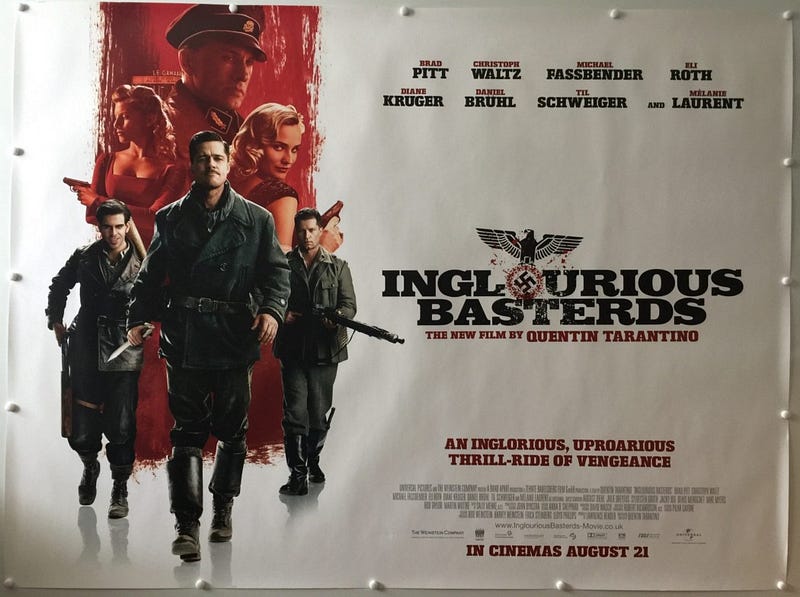
“That’s a Bingo!”
Eagerly anticipated, I saw this gem three times at the Cinema in it’s opening week and loved it every time. The opening scene is a masterpiece, so many subtleties and nuances and also a very little touch from Tarantino. He lets the screenplay and actors breathe. The middle third is darkly comedic, spilling into the last Chapter which is Tarantino at his very best again. But in my opinion this is Tarantino’s least stylistic. Of course there are numerous trademarks, close ups, bizarre character creations, screeching left turns into bizarre flashbacks and sometimes parody. The joy of this film for me is the lightness of touch throughout from Tarantino, letting his character creations flourish and develop to tell a very compelling tale.
Tarantino’s Tale: 5 interweaving narratives across a four year period of World War II. An alternative history as some have called it, which is plain bizarre, but perhaps indeed apt for the film. Assassination plots and revenge, all backed by a sublime soundtrack that is highly recommended.
The A-list cast provide superb performances: Brad Pitt (Aldo Raine), Diane Kruger (Bridget von Hammersmark), August Diehl (Major Hellstrom), Slyvester Groth (Joseph Goebbels) and Melanie Laurent (Shoshanna), with eclectic supporting cameos from Eli Roth (Donny Donowitz), Mike Myers (General Ed Fenech) and Martin Wuttke (Hitler).
For this, Tarantino’s 6th film, I’m concentrating on two of my favourite actors of modern day, Michael Fassbender and Christoph Waltz.
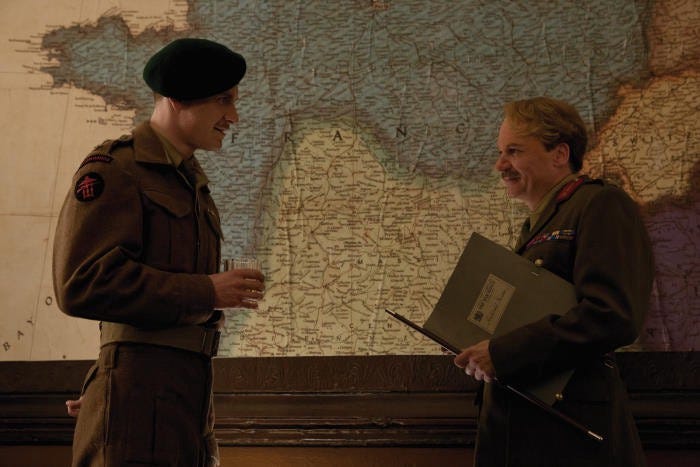
“Archie Hicox” (Michael Fassbender) Heart breaking as Bobby Sands in 2008’s Hunger, his creation of David in Prometheus was the star turn of an otherwise ok film. As Brandon in 2011’s Shame he mesmerises you with his graphic descent into hell and his verbal duel with Viggo Mortensen in 2011’s A Dangerous Method is a joy.
Appearing in just three scenes of the “Operation Kino” Chapter, Fassbender’s role as Archie Hicox is a supporting one but is both a standout and triumphant performance. Alongside a quietly effective cameo from Mike Myers as “General Ed Fenech” (and his small nod to his alter ego character of Austin Powers), his first introduction is of an upright English gentleman soldier, eloquent and intelligent and a scholar of the 1920’s/1930’s German film industry. A quiet beginning, as is his introduction to The Basterds! Trying to ingratiate himself within a tight knit team, he fully engages with all the team present, but it’s his performance in the ensuing French bar that is magnificent. Now undercover and speaking German fluently, he is accompanied to the rendezvous with the double agent Bridget Von Hammersmark by Basterds members “Hugo Stiglitz” (Til Schweiger) and “Wilhelm Wicki” (Gedeon Burkhard).
Throughout the bar scene whenever Fassbender is on screen he demands your attention. The part is played magnificently with his eyes alone at times, especially when talking with Von Hammersmark or chastising a drunk German soldier. He is seeking to gain total control of the situation and this is heightened in his exchange with “Major Hellstrom”. August Diehl is magnificent here and in other scenes of the film, but the interplay between both Diehl and Fassbender here is sublime. Never taking their eyes away from each other, the discontent and resentment each other show despite the fake smiles and laughter is brilliantly captured by Tarantino and yet another example of a subtle at times, Mexican standoff.
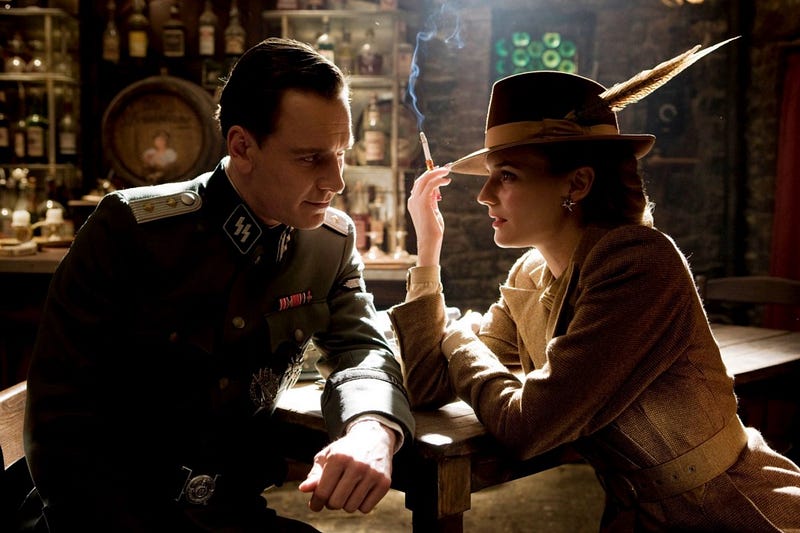
Long before his own error, Fassbender’s slight change in demeanour and frown replace the laughter of before and the resigned, knowing look he gives his team as he distributes the whisky before the final showdown is priceless.
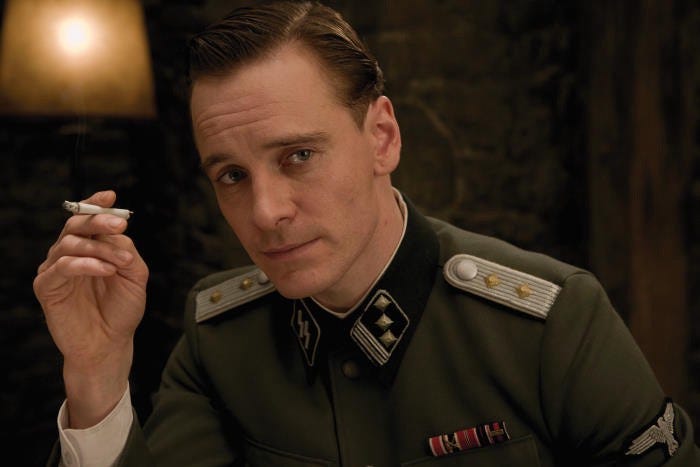
Reverting to English, he captures the character of Archie Hicox perfectly:
“Well, if this is it, old boy, I hope you don’t mind if I go out speaking the Kings. There’s a special rung in hell reserved for people who waste good scotch. Seeing as I may be rapping on the door momentarily, I must say, damn good stuff sir. Now, about this pickle we find ourselves in…….”
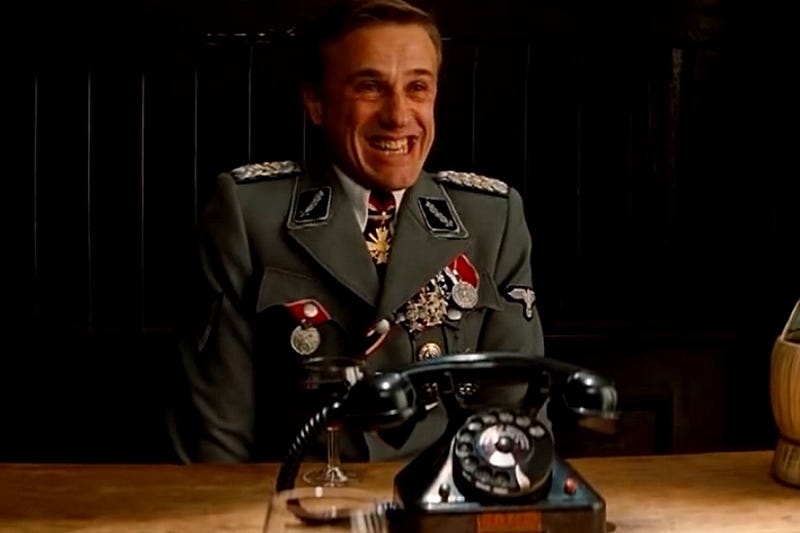
“Hans Landa” (Christoph Waltz) Having only seen Carnage (post Inglorious Basterds and pre Django Unchained) it’s difficult to appraise him on his other films. Yet it was Waltz who had me completely transfixed when I saw the film for the first time. Subtle, on the edge of mayhem and madness, yet brilliantly playing a more comedic role when required.
From his very introduction in the first scene of the film, Waltz as “Hans Lander” is always one step ahead of his adversaries, and always treading a fine line between calm, methodical precision and revengeful anger. He revels in his role bestowed upon him by The Fuhrer, and of his “Jew Hunter” nickname.
Throughout all of his interrogations, official and un-official, he lives up to his moniker, seemingly ahead of the game, already out thinking and out smarting his prey. His performance in the first Chapter is a master class of character acting. Smiling and cordial to his hosts, yet instantly back to a blank, vacant expression, it’s key to note his repeated glances and stares at young daughter “Charlotte”, three or four times he returns a glare that establishes his duality and of his exertion of control. The interchange between himself and “Mr LaPadite” (an excellent cameo from Denis Menochet) in the opening Chapter is the perfect introduction to Hans Lander. Meticulous and methodical, in control and determining the pace of the conversation, Mr LaPadite slowly crumbles as the SS Detective exerts control.
The comedic break with the smoking of their pipes is typical Tarantino and the first of only a few such trademarks in the opening Chapter. This is Waltz’s performance to the fore, brilliantly encapsulated when, after Mr LaPadite has asked if it’s ok to smoke his pipe in his own house, a smiling Hans Lander replies “Please Mr LaPadite, this is your house. Make yourself comfortable!”
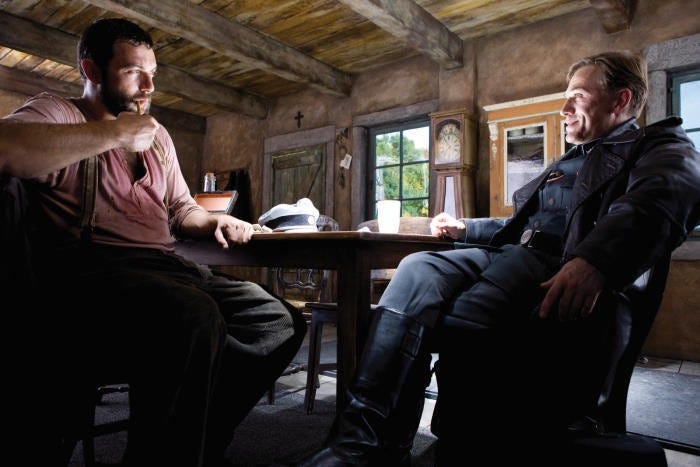
Following the slaying that ensues, and with “Shosanna” (stand out performance from Melanie Laurent) in his sights as she escapes, pistol cocked and ready to fire he revels in the apparent ability to decide life and death. Despite her escape, he is almost triumphant in his “au revoir Shosanna!” exhortation. It brings to an end the best of the five Chapters, and a masterclass from Christoph Waltz.
His brief appearances in Chapters Three and Four layer the character perfectly before another full on performance in the final Chapter. Playful, blackly comedic interrogations, with Waltz always dominating both the story and the screen abound in this Chapter, as does the change from calm and meticulous, to avenging killer.
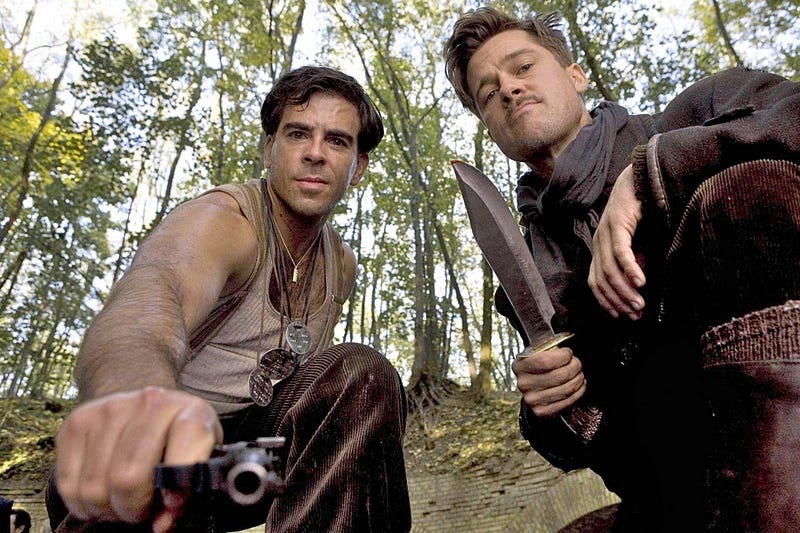
Aside from these two fantastic character performances is a gem of a film that excites me every time I watch. Critically panned (what else?), it’s Quentin Tarantino dialled up to about 9 on a scale of 10. As I’ve noted above, what I love most about this film is Tarantino’s lighter touch and letting the characters he created actually breath throughout the film. At over two and a half hours it is one of his longer films but one with very different stories, varying locations and narrative strands to pull together.
It’s brilliant. It’s critically hated?
Excellent!
Tarantino is clearly having the desired effect.
Thanks for reading. Just for larks as always, and always a human reaction rather than spoilers galore. My three most recently published film articles are linked below or there’s well over 180 blog articles (with 350+ individual film reviews) within my archives from which to choose:
“Trance” (2013)
“Do you want to remember? Or, do you want to forget?”medium.com
“The Man Who Wasn’t There” (2001)
My Coen Brothers Top Ten — Vol 8.medium.com
“V for Vendetta” (2005)
A cinematic debut for the ages from James McTeigue.medium.com



